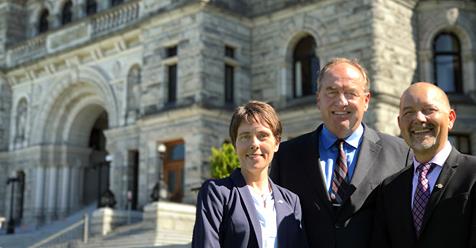Findings of fish processing compliance audit show need for reform
The BC Government today released the Fish Processing Facilities Compliance Audit Report that was commissioned following findings by Tavish Campbell that effluent containing the Piscene Reovirus (so-called “blood water”) was being discharged from a BC fish processing facility.
This issue was explored by my colleague Sonia Furstenau during question period late last year:
The report provides a clear illustration of the type of problems that have arisen from the previous BC Liberal administration’s severe cutbacks to compliance and enforcement initiatives within government.
As the Minister of Environment and Climate Change Strategy noted in the government’s statement accompanying the report’s release:
“The industry has been largely operating under an outdated permitting regime, going back several decades. We are taking immediate steps to ensure permits are updated and strengthened at fish processing facilities throughout B.C.”
Between ICBC, money laundering, the housing crisis and a litany of environmental disasters, it’s increasingly clear that the previous government badly mismanaged our province.
Government has a responsibility to ensure the public interest by proactively updating laws and regulations to fit changing realities. Instead, the previous government left British Columbians with mounting debts while they pillaged the public books and turned a blind eye to harmful activities. We have taken significant steps to remedy this, including banning big money and reforming the lobbying industry, but we must take every opportunity in this minority government to clean up B.C. to prevent such blatant misuse of power.
Below I reproduce the media statement that the BC Green caucus issued in response to government’s release of the report.
Media Release
Findings of fish processing compliance audit show need for reform: B.C. Green caucus
For immediate release
July 4, 2018
VICTORIA, B.C. – The B.C. Green Caucus is calling on government to step up marine monitoring and protection in the wake of an audit of fish processing facilities. Andrew Weaver, leader of the B.C. Green Party, says the report shows a disturbing pattern of widespread mismanagement by the previous B.C. Liberal government that must be addressed.
“Between ICBC, money laundering, the housing crisis and a litany of environmental disasters, it’s increasingly clear that the previous government badly mismanaged our province,” said Weaver. “Government has a responsibility to ensure the public interest by proactively updating laws and regulations to fit changing realities. Instead, the previous government left British Columbians with mounting debts while they pillaged the public books and turned a blind eye to harmful activities. We have taken significant steps to remedy this, including banning big money and reforming the lobbying industry, but we must take every opportunity in this minority government to clean up B.C. to prevent such blatant misuse of power.”
Sonia Furstenau, environment spokesperson, added that the findings show why government should adopt Mark Haddock’s recommendations to reform the professional reliance model.
“As the previous government cut the funding needed to fulfill government’s duty to protect the public interest, they saddled our province with completely avoidable messes,” said Furstenau. “Many British Columbians were horrified, like I was, to see Tavish Campbell’s videos of blood water effluent that prompted this audit. It is no wonder people don’t trust the process when we must rely on private citizens and the media to bring such serious issues to light. Adopting Mark Haddock’s recommendations – and the ministry’s recommendations following this audit – will go a long way to restoring the public’s trust that government is looking out for their health and safety, as well as the long-term sustainability of our natural resource sector.”
Adam Olsen, spokesperson for agriculture, said the findings underscore the litany of threats facing B.C.’s wild salmon and added the release of infected blood from farmed fish is another reason why the government should keep its promise to transition away from open-net pen finfish aquaculture.
“Wild salmon are culturally, economically and environmentally essential to our province, yet we are allowing them to be hit at every stage of their development,” said Olsen. “Now we learn they have also been exposed to ‘acutely lethal’ levels of effluent.”
DFO’s 2018 salmon outlook for B.C. states that of 91 different groupings of salmon, only 28 are expected to be at or above the amount necessary for a healthy population.
“This is absolutely unacceptable – we can and we must do better if we want our grandchildren to live in a province with wild salmon,” added Olsen.
-30-
Media contact
Jillian Oliver, Press Secretary
+1 778-650-0597 | jillian.oliver@leg.bc.ca
Welcoming the establishment of a basic income expert committee
Back in 2016, I published a series of four blog posts exploring the notion of Basic Income.
In the first I provided an overview of the concept, the issues that we are facing today in BC, and the potential implications of a basic income policy. This was followed by a second post that examined the state of poverty in BC, including the social assistance programs available and how they can fail to help those most in need. It also explored how basic income could help to alleviate poverty in our province. The third post outlined the shift we are experiencing as a population away from long-term, full-time work with benefits, toward short-term, part-time, and contract-based work.
The series culminated in a final post that provided recommendations and a commitment to British Columbians. That commitment was that a BC Green government would introduce pilot projects that explored the costs and benefits of basic income. And so the promised establishment of such pilot projects formed a key aspect of the Income Security component of our BC Green 2017 election platform.
The Confidence and Supply Agreement that we signed with the BC NDP noted the following in Section 4a:
a. Design and implement a province-wide poverty reduction strategy that includes addressing the real causes of homelessness, including affordable accommodation, support for mental health and addictions and income security.
i. One aspect of the poverty reduction strategy is to design and implement a basic income pilot to test whether giving people a basic income is an effective way to reduce poverty, improve health, housing and employment.
The BC Government yesterday announced its first step towards fulfilling this commitment. With dedicated funding in the last budget, an expert panel comprising three distinguished researchers has been established to lead a B.C.-focused exploration of basic income.
In the government press release I note:
“Amidst trends like automation, part-time and contract work, the nature of our economy and the jobs within it are rapidly shifting. There is strong evidence that basic income can provide greater income security, while saving costs in other areas. We proposed exploring how basic income could work in B.C., because government should have a plan for the changes on the horizon. The panelists are highly qualified, knowledgeable and creative thinkers. I am excited to work with them on this innovative project.“
Below is the release the BC Green caucus issued in response to the government’s announcement.
Media Release
Weaver welcomes basic income expert committee
For immediate release
July 3, 2018
VICTORIA, B.C. – Andrew Weaver, leader of the B.C. Green Party, says that the government’s newly convened Basic Income Expert Panel is a significant step forward for the province’s 21st century economic strategy. The committee was announced at a press conference today in Vancouver and is related to the B.C. Greens’ Confidence and Supply Agreement with the B.C. NDP.
“At this moment, on the verge of fundamental economic change and with the old
model of work already faltering for so many, we have an opportunity to create policy that sets
the stage for a better future for British Columbians,” said Weaver.
Weaver has advocated for exploring basic income in B.C. since 2016. In the 2017 election, the B.C. Greens campaigned to conduct a basic income pilot and implement basic income for youth transitioning out of care. The expert committee members are David Green, Vancouver School of Economics at UBC; Jonathan Rhys Kesselman, School of Public Policy at SFU; and Lindsay Tedds, School of Public Policy at the University of Calgary.
“Recent years have seen disproportionate increases in part-time and contract work. Wages have stagnated while the cost of living in our cities has spiralled out of control. Meanwhile, studies estimate that half of Canadian jobs could be impacted by automation in the next decade alone. We proposed exploring basic income in B.C. because we believe that government needs to have a plan for the changes on the horizon.
“When people are secure, they are more likely to feel confident starting a new business or returning to school. Investing in British Columbians’ success is the best way we can ensure a thriving local economy for generations to come. Further, research shows that basic income can provide income security while reducing the costs of other supports. For instance, when basic income was introduced in Dauphin, Manitoba, hospital visits declined by 8.5%.
“The committee members are all highly qualified researchers and creative thinkers. I am delighted they will be exploring this innovative policy idea for government so that we can best position our province to succeed in a changing world.”
-30-
Media contact
Jillian Oliver, Press Secretary
+1 778-650-0597 | jillian.oliver@leg.bc.ca
German report demonstrates need for systemic change, investigation into links with real estate sector
The BC Government today released Peter German’s long awaited report on money laundering in Lower Mainland casinos.
The report, entitled Dirty Money: An Independent Review of Money Laundering in Lower Mainland Casinos conducted for the Attorney General of British Columbia, demonstrates systemic failure within the previous government to adapt our laws and regulations to changing realities.
Below is the media release we issued in response to the report’s release.
Media Release
Weaver: German report demonstrates need for systemic change, investigation into links with real estate sector
For immediate release
June 26, 2018
VICTORIA, B.C. – Andrew Weaver, leader of the B.C. Green Party, welcomed Dr. Peter German’s independent review of money laundering in Lower Mainland casinos. Weaver says that German’s finding that large-scale transnational money laundering has been occurring in our casinos, and that B.C.’s laws and regulations have not kept pace with changing realities, demonstrates the need for wholesale policy change.
“Dr. German’s report demonstrates systemic failure within the previous government to adapt our laws and regulations to changing realities,” said Weaver.
“We have seen significant growth and change, both in B.C. and globally, since many of our laws and regulations were first developed. Outdated policies have left our province vulnerable to exploitation as transnational criminal entities have become increasingly more sophisticated.
“It is encouraging to hear that recent government actions have led to a significant reduction in suspicious activity in B.C. casinos, and I am pleased that the Attorney General has accepted the recommendations. What is most important now is that government provide clear timelines for implementing the recommendations and is transparent with regards to progress. In particular, the recommendation that the Province undertake research into allegations of organized crime penetration of the real estate industry should be at the top of government’s agenda. British Columbians are looking for answers as to why our housing market spiralled out of control so quickly and if we are to develop effective solutions we must undertake a thorough investigation of this issue.
“Government cannot be asleep at the switch amidst such significant threats. Going forward, government must be significantly more proactive in modernizing our laws and regulations so that we are not faced with such a crisis again.”
-30-
Media contact
Jillian Oliver, Press Secretary
+1 778-650-0597 | jillian.oliver@leg.bc.ca
On the governments “Speculation Tax”
Over the last few months, I’ve been contacted by numerous constituents concerning the BC Government’s proposed “Speculation Tax”. Constituents who have contacted my office would have received an email outlining my views on this proposed measure. As the BC Green critic and spokesperson on the demand side of the affordability file, I felt it was instructive for me to make these views more readily available. Below I reproduce the contents of the email constituents would have received.
A group will be hosting a town hall on the speculation tax at the Dave Dunnet theatre at Oak Bay Secondary School from 19:00 to 21:00 on Thursday, June 28th. I look forward to hearing your views on the issue.
Text of Email
Thank you for writing to me about the government’s proposed speculation tax.
The speculation tax will be proposed in legislation that is to be brought forward in the fall.
In accordance with our Confidence and Supply Agreement, government consults with our Caucus on many matters. All input we provide government is aimed at producing evidence-based public policy that will deliver outcomes that are in the best interests of the province as a whole.
The BC Greens have indicated to government that we do not support the speculation tax because 1) it doesn’t address speculation; 2) there are too many unforeseen consequences; 3) it is administratively burdensome.
The speculation tax targets two distinct issues. The first is vacant properties. The second are satellite families — families who pay little or no taxes here in Canada.
The BC Greens recommended several alternate approaches to government on how to better deal with the housing crisis. First, we suggested that government introduce enabling legislation to allow local governments to implement a vacancy tax if they felt it was necessary for their communities. Victoria, for example, has asked for the powers to introduce such a tax. Enabling the ability of local governments to introduce a vacancy tax is relatively straightforward. The legislative language already exists in the Vancouver Charter.
Three benefits of this approach are that any monies raised would remain in the affected community, its implementation would be highly focused, and the issue of double taxation in the Vancouver area would be addressed. Should vacancy or rental shortage issues no longer be a problem, local governments could also respond rapidly without the need for provincial legislation.
Another recommendation of the BC Greens was to introduce a New Zealand-style ban on foreign purchases in the secondary housing market unless trade agreements prohibit this. New Zealand, for example, excluded Australia in its offshore buyer ban due to existing agreements.
In addition, we recommended the closure of the bare trust loophole and the introduction of a flipping tax – a tax levied on people who flip properties, buying and selling them in a short timeframe for significant profits.
The information that we provided government regarding the speculation tax was that it should be as targeted as possible in addressing speculative activity in the housing market. We also communicated that government should work to minimize unintended consequences on people and activity we don’t want to target, without fundamentally undermining the impact of the tax.
The BC Green caucus also articulated a number of problems with the proposed speculation tax. We pointed out that it made no sense to have a vacancy tax applied to strata units that had “no rental” clauses in their rules.
In areas that are disproportionately home to vacation property owners (e.g. Cultus Lake prior to its exemption), the local economies are dependent on seasonal visitors and part-time residents. Therefore, implementing this tax would have negative consequences on these economies that likely outweigh the benefits. This remains a problem with the proposed inclusion of Kelowna and West Kelowna in the Speculation Tax.
We noted that in some areas covered there is no substantive rental market (e.g. islands with no ferry service). And we continue to remain concerned that Canadians from different provinces will be treated differently. We remain committed to the notion that all Canadians should be treated equally.
We look forward to seeing the government’s legislation in the Fall. We remain committed to our shared goal of taking action to address the housing affordability crisis.
I hope this helps to clarify my position and the actions I am taking on this tax. There is so much uncertainty still out there on this speculation tax and it is not something the BC Greens would have proposed.
Best wishes,
Andrew
Modernizing & streamlining government’s procurement process: an opportunity for innovation
Today, the Ministry of Citizens’ Services announced that it is modernizing and streamlining the government procurement process in order to better support BC businesses.
I welcome this initiative, which we also called for in our election platform, but in my view all government supports for small businesses and entrepreneurs should be modernized to respond to the changing needs of business and to ensure that we are doing everything we can to support these innovative British Columbians.
Below is the media release we issued in response to the government’s announcement.
Media Release
Weaver welcomes new government procurement process, calls for comprehensive streamlining of support for innovators
For immediate release
June 25, 2018
VICTORIA, B.C. – Andrew Weaver, leader of the B.C. Green Party, welcomed government’s announcement that it is streamlining procurement to better support B.C. innovators. Weaver added that the government should streamline and modernize all supports for B.C. small businesses and innovators.
“This is a good first step towards supporting B.C. innovators and demonstrates why government should streamline and modernize all support for entrepreneurs,” said Weaver.
“Government needs to be a leader in ensuring that we are invested in the success of B.C. companies. One of the biggest challenges I hear from small businesses and start-ups is that government programs and support initiatives are disparate and cumbersome to navigate. Additionally, business models and the needs of entrepreneurs are evolving due to the changing nature of our economy. Government procurement is an important piece of the puzzle, but there are many other programs that help businesses grow. By ensuring that government programs are responsive to the changing needs of business and making them easier to navigate, we can ensure we are providing useful, efficient support for our homegrown innovators.
“Innovation-driven industries, be they in clean tech, high tech or value-added resources, are undoubtedly the future of B.C.’s economy. Not only are these industries leading the global economy, they provide well-paying jobs and are compatible our province’s strategic strengths and values. I am pleased that key elements of our economic plan to support these industries, the Innovation Commission and the Emerging Economy Task Force, have been adopted by the B.C. NDP government through our Confidence and Supply Agreement. I look forward to continuing to work closely with government to support the development of a thriving, innovative 21st century economy.”
-30-
Media contact
Jillian Oliver, Press Secretary
+1 778-650-0597 | jillian.oliver@leg.bc.ca








